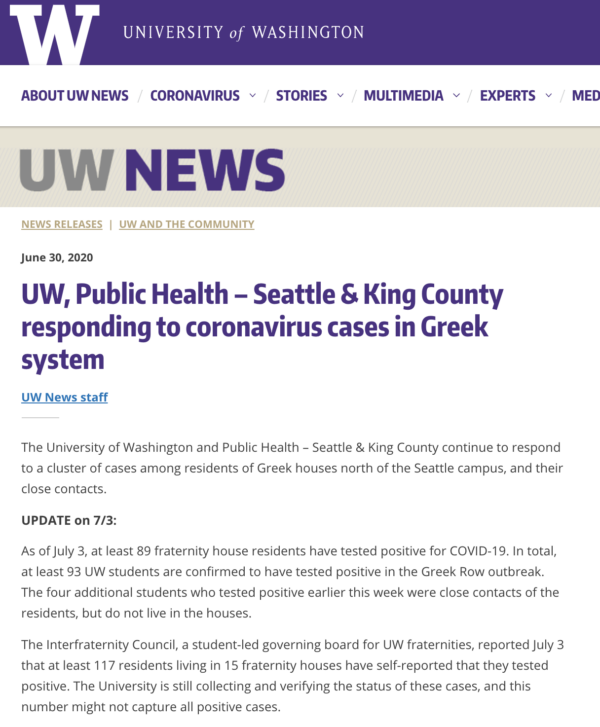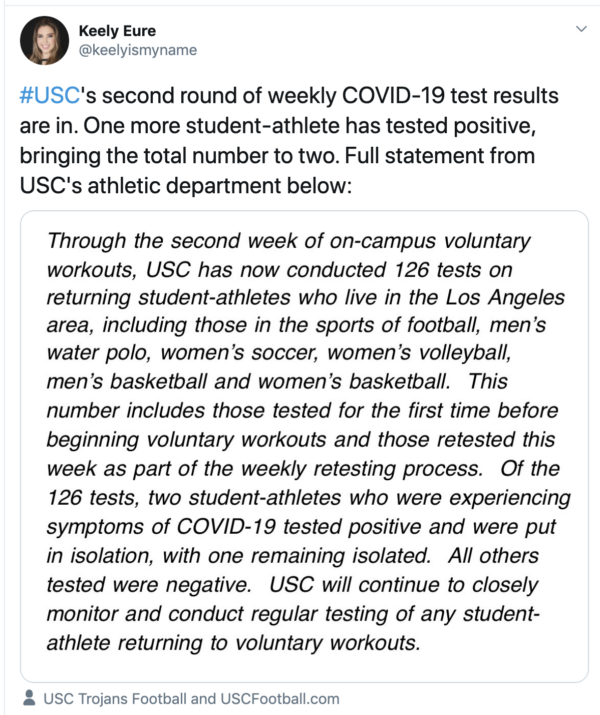Last updated on 07/05/2020
7/5/2020: In the RG letters:
As an alumnus, I strongly object to the decision by the University of Oregon to hide any information about the number of athletes testing positive for coronavirus. Why?
One, the decision represents a disservice to, and potentially puts at risk, other members of the team as well as other students and the public. Clearly most Oregonians and other Americans are concerned about the pandemic and want to be fully informed about infection rates and potential risks.
Two, the decision runs counter to what some, though not all, Pac-12 schools, and many colleges outside the Pac-12, are doing. For example, the University of Colorado, Oregon State University and the University of Washington are reporting the number of athletes testing positive.
UO claims that this decision was made to protect the privacy of athletes per “federal and state law,” implying that other colleges, such as OSU, are violating those statutes by publishing the very type of non-identifiable information that the UO refuses to release.
Finally, the decision contradicts the university’s purported commitment to prioritize health and safety above all else, and to maintain transparency, during the pandemic. It clearly prioritizes athletic department finances over health and welfare of athletes, other students and the public.
Bob Weinstein, Portland
7/4/2020: Still no details from UO, while UW is even reporting fraternity cases:
(Thanks to a reader for the link).
7/3/2020: That would of course *not* be the University of Oregon, which posts only numbers, here. Other universities release more helpful info – e.g. UCLA, here. Oregon State reports positive athlete tests, UO does not. Why not?
Even USC – never known for transparency, and as a private school exempt from public records laws – does a better job than UO. Here’s a tweet from one of their PR flacks:


I’m unclear on why athlete cases should be reported separately. There is a legitimate privacy concern here. If FERPA is interpreted strictly, OSU and UW probably shouldn’t be reporting breakdowns either. It’s hard to fault a school for protecting student privacy, and even harder to see how this information helps public health.
I don’t see why releasing count data would violate HIPAA or FERPA, nor do I see a privacy concern in announcing count data like “2 positive cases were students living on-campus” or “out of 100 athletes tested last week 2 tests were positive”. As to helping public health, I think anything that builds public trust in the accuracy and completeness of the information that public institutions provide about public health issues is a good thing. Additionally, this information would help people make better decisions about risky behaviors and mitigation efforts.
On the privacy/FERPA angle, I’ll note that UO did release break-outs of sexual misconduct complaints against athletes and other students, after some prodding by ESPN, as explained here: https://uomatters.com/2018/12/uo-athletes-6x-more-likely-to-be-reported-for-sexual-misconduct-than-all-students.html
Count data isn’t anonymized if the samples are so small that it’s possible to make good guesses about which reports corresponds to whom. Sexual assault data isn’t comparable to health data, so this isn’t a good analogy, whether or not it’s a good precedent.
Can you be more specific about why you think there is a general public health benefit to knowing the number of infected athletes or fraternity members as opposed to a total campus count? Presumably anyone in the campus community at risk of having been exposed would be notified by a contact tracer.
Everyone knows who is infected because your organization is gossipy. Your confidentiality is a farce that benefits the institution not the players. Your (and Lane County’s) contract tracing is straining under the weight of your bad policies. It’s only a matter of time before this spins out of control.
And sexual assault not a health issue. Ok?
Honestly, I’m pretty surprised Washington IS releasing this information. In other contexts they err unusually far on the side of caution as far as student privacy. I do fall on the side of this being protected information, though; if we think that as a community we deserve this medical information from them, then we should get names and information for all cases, and we don’t, because HIPAA. I see the argument that the close contact etc associated with the student athlete situation makes for information that is maybe epidemiologically relevant in terms of what happens in a young and unusually healthy/medically-well-tended population, but I also don’t think anyone feels like non-student-athletes owe other people this data.
Imagine that, a publicly responsible citizen complaining about UO eliteness …
UO has long been embarrassing in the application of FERPA to avoid telling the truth about embarrassing incidents. They hide inconvenient information by default.
No argument there, but however embarrassing rates of infection among athletes and fraternities are to UO, the infected students don’t deserve to have that information made public.
No one is proposing outing anyone, just asking for a few cross-tabs of information that would not allow identification by name. Which makes me wonder how the contract tracers handle FERPA and HIPAA – those must be some difficult conversations.
Meanwhile, I read that Harvard plans to go all-online next year.
I somehow doubt that UO will actually reopen.
I’ve noticed that even certain bars near campus that were packed, now look almost empty.
The Southern and semester schools will reopen in August. They will spike quickly and then shut down. The quarter system schools will see the writing on the wall and go online (sorry, remote).
yeah this is a great idea. Let’s invite all the student back for two weeks or so, and then tell them, after they have properly spread the virus among themselves, that it is now time to leave – so get on a plane, go home, and infect a whole bunch of new communities …
Meanwhile, a well-endowed Stanford is dropping 11 sports, per today’s WaPost and NYTimes.